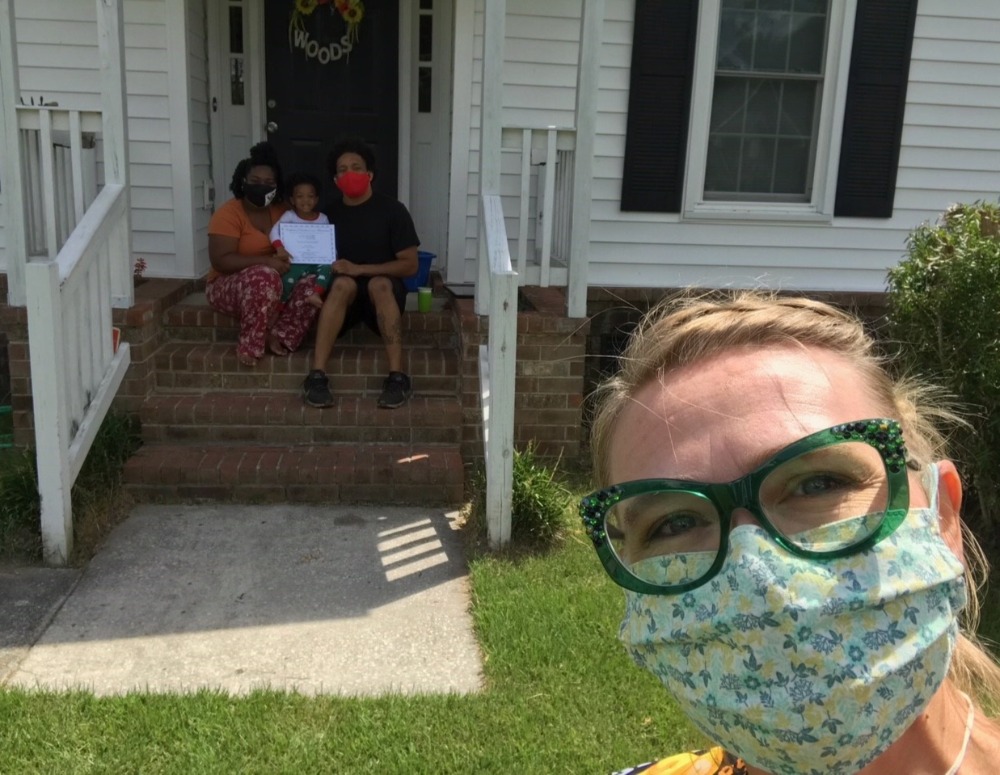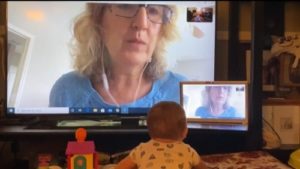Children’s Trust continues to work with its home visiting partners across South Carolina to ensure mothers and young children receive key support and resources during the coronavirus pandemic. Here’s a look at the success of DHEC Lowcountry Region providing the Nurse-Family Partnership home visiting model to families despite a limit on in-person contact.

Dawn Vawter, a nurse home visitor with DHEC Lowcountry Region Nurse-Family Partnership, gets a graduation certificate to one of her families in the home visiting program.
Lindsay Odell knew there would be many challenges safely providing home visiting to mothers and young children when the coronavirus outbreak accelerated in the spring.
As the nurse supervisor for the Nurse-Family Partnership (NFP) program model for the S.C. Department of Health and Environmental Control (DHEC) Lowcountry Region, Odell quickly had to figure out what needed to be done to ensure the continuation of essential resources for families, especially those considered at-risk. But with in-person visits no longer recommended due to the spread of COVID-19 over the last six months, DHEC Lowcountry NFP made crucial adjustments to how it provided program support.
For the first time, the agency was able to use Skype and FaceTime for home visits. It created a process for obtaining virtual consent from clients so that new moms and babies could be enrolled remotely. Smart phones also were provided to clients without phone access through an initiative with the national office.

Lindsay Odell
“We had to make sure our technology and tools met our needs, which included changing some policies and platforms,” Odell said. “For several months, we did weekly ‘Mommy & Me’ story time on Zoom to allow clients to socialize and feel less isolated. Nurse-Family Partnership has always been a flexible model, but it has become even more flexible with the transition to exclusive telehealth.
“The nurses no longer have to factor in the time it takes to drive between their clients’ homes across three counties so they are able to allow for last-minute rescheduling and adjustments in the clients’ availability. We have also been providing porch drop-offs so that clients can receive much-needed support materials, such as car seats, pack-n-plays, and books.”
Home visitors – who can be nurses, social workers or child development specialists depending on the program model – support preventive health and prenatal practices, help parents understand developmental milestones, promote the use of positive parenting techniques, and work with mothers to set goals for the future, continue their education, and find employment and child care solutions.
Children’s Trust Leads Home Visiting Across the State
As South Carolina’s lead agency for the Maternal, Infant and Early Childhood Home Visiting (MIECHV) federal grant since 2010, Children’s Trust supports three evidence-based, voluntary home visiting models – Healthy Families America, Nurse-Family Partnership, and Parents as Teachers – in partnership with 16 implementing agencies covering 40 counties. Children’s Trust supported these sites in South Carolina to provide more than 17,000 home visits over the past year with funding from the U.S. Health Resources and Services Administration’s Maternal and Child Health Bureau.
Eric Bellamy, chief partner engagement officer for Children’s Trust, has overseen the MIECHV grant for 10 years, and he salutes the field work of home visiting providers who have refused to let obstacles keep them from helping families.

Eric Bellamy speaks at a Home Visiting Summit.
“As an original partner of the MIECHV initiative, the NFP program at DHEC Lowcountry has been a long-standing service provider for families in the Tri-County Area (Berkeley, Charleston and Dorchester counties) of the Lowcountry,” Bellamy said. “They remain dedicated to serving and achieving high outcomes for families through innovative means — especially during these unprecedented times in 2020. Under Lindsay’s supervision, this team remains one of the highest achieving sites that Children’s Trust supports with a current enrollment capacity of 98 percent. Their diligence has been unwavering.”
During these times of social isolation, the nurses at DHEC Lowcountry NFP have served as lifelines for the program’s mothers, fathers and young children who are feeling disconnected from the world around them.
Odell is grateful for the window that telehealth provides to connect those families with resources they may not have needed before, such as food, baby items, and rental assistance. The televisits also help screen for red flags, which can be addressed sooner than if the mother was not regularly connected to her nurse.

Nurse home visitor Lori Lefebvre conducts a virtual home visit with a family.
“Home visiting is more important now than ever. Our clients and babies are more at risk for intimate partner violence, abuse and neglect, and mental health concerns than previously because of the isolation and additional stressors related to living through a pandemic,” Odell said. “We have seen more clients accessing mental health services recently. This speaks to both the need as well as the accessibility with so many providers offering telehealth options.”
Nurse home visitor Dawn Vawter remains thankful for the policy changes that allowed NFP to utilize FaceTime and Skype.
“It’s hard to fully engage a momma and a baby over a phone call,” Vawter said. “Plus I love getting to see and begin to connect with a new baby that we have all been anticipating.”
Tackling Multiple Duties During COVID-19 Outbreak
The nurses on the NFP staff have managed to continue home visiting despite being needed at times to address a broader mission because of the coronavirus-related issues. During the first months of the pandemic, nurse home visitors were pulled away to assist with contact tracing and case investigations. More recently, they have been enlisted to assist with COVID-19 testing. Odell anticipates that in future months, their nurses will be needed to help provide vaccines for the coronavirus once they are available.
This situation differs from other disaster responses — like sheltering during hurricane evacuations – because it is so prolonged.
“Successful outcomes in home visiting are so dependent on the consistent relationship between the nurse and client,” Odell said. “It’s difficult for another nurse to step in and temporarily provide services to a client. Thankfully, our management has understood the need to balance pandemic response with supporting our clients and have worked with us to get the nurses back to their NFP roles as quickly as possible.”
Bellamy appreciates what DHEC Lowcountry NFP has done to balance its home visiting duties with its COVID-19-related work. He believes it all fits perfectly with the Children’s Trust efforts to strengthen systemic support for the primary prevention of child abuse and neglect.
He calls it essential that Children’s Trust supports its many community partners in the field across South Carolina.
“The intervention of home visiting remains one of the strongest methods of these prevention efforts while building child and family well-being and self-sufficiency,” Bellamy said. “The COVID-19 pandemic has introduced both gaps and opportunities for family supports. The efforts and strategies employed by local home visiting programs are primed to address these. We are dedicated to the continued support of these and other proven effective programs and interventions.”




